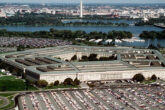March 12, 2019
Is the Pentagon Truly Committed to the National Defense Strategy?
As Senate and House committees examine the Trump administration’s proposed defense budget for fiscal 2020 — it totals three-quarters of a trillion dollars — the first and most important question they should ask is: Does this budget decisively improve the U.S. posture for great-power competition with China and Russia?
The 2018 National Defense Strategy developed under the leadership of Secretary James Mattis made clear the need to prioritize major improvements in the U.S. ability to deter Chinese or Russian aggression. In particular, it aimed our armed forces at defeating Chinese and Russian theories of victory, especially any efforts to rapidly create a fait accompli — for example, a Chinese invasion of Taiwan or a Russian invasion of the Baltics—which would likely be the most stressing armed aggression Beijing or Moscow might attempt.
Crucially, the NDS’ shift toward great-power competition enjoys strong bipartisan support, reflected in its endorsement by the National Defense Strategy Commission, a group of distinguished former officials and experts from both parties chartered by Congress to review the Strategy. This is no coincidence. Indeed, the NDS builds on much of the momentum and intellectual capital developed during the latter part of the Obama administration, especially in the Pentagon’s so-called Third Offset Strategy. The need for a shift away from nearly two decades of focus on counterinsurgency operations to great-power competition is clear, and it is not a partisan issue.
Read the full article in Defense One.
More from CNAS
-
The Department of Defense’s Breakthrough Nuclear Moment Risks Slipping Away
Unless they act, the Department of Defense’s breakthrough nuclear moment may vanish before it really happens....
By Will Rogers
-
DEFAERO Strategy Series [Apr 09, 25] CNAS' Becca Wasser and Phil Sheers on Revitalizing the U.S. Defense Industrial Base
On this episode of the Defense & Aerospace Report Strategy Series, sponsored by General Atomics Aeronautical Systems, Becca Wasser and Phil Sheers of the Center for a New Amer...
By Becca Wasser & Philip Sheers
-
From Production Lines to Front Lines
Executive Summary The U.S. defense industrial base (DIB) is struggling to meet the demands of the current strategic environment—let alone prepare for a potential conflict agai...
By Becca Wasser & Philip Sheers
-
The Pentagon’s Endangered Brain Trust
In this environment, sound assessments of emerging threats and new ideas to counter them will be especially vital....
By Dr. Andrew Krepinevich, Jr.




